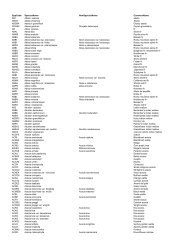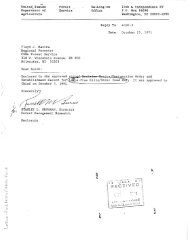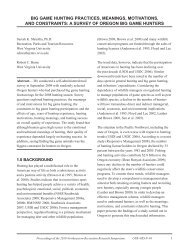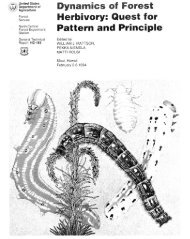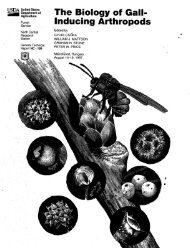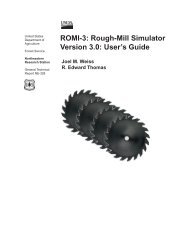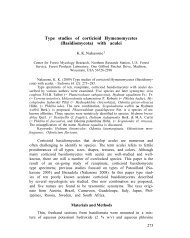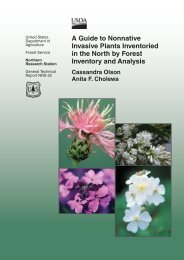Proceedings of the 2009 northeastern recreation research symposium
Proceedings of the 2009 northeastern recreation research symposium
Proceedings of the 2009 northeastern recreation research symposium
Create successful ePaper yourself
Turn your PDF publications into a flip-book with our unique Google optimized e-Paper software.
containers, instead <strong>of</strong> plastic bags, as <strong>the</strong>y’re bad<br />
for <strong>the</strong> birds.<br />
Brianne made many lifestyle changes after completing <strong>the</strong><br />
outdoor education course:<br />
I fi nd that I am a label reader and I’m trying<br />
to compost and I’m just being a little bit more<br />
environmentally friendly. I bought biodegradable<br />
dog-poo bags. I have noticed that I’ve tried to<br />
make a little bit <strong>of</strong> a diff erence in my habits that<br />
I didn’t really appreciate before.<br />
Illustrative <strong>of</strong> <strong>the</strong> course’s long-term impact on Brianne’s<br />
environmental behaviors, she was able not only to<br />
maintain her own behaviors but also to improve those at<br />
her workplace:<br />
Like at work, actually, I work at a restaurant and<br />
we never recycled and it drove me nuts, and so<br />
I remembered being like, “Do you understand<br />
what you’re doing to <strong>the</strong> environment?” I talked<br />
to <strong>the</strong> boss and now we recycle.<br />
3.3.3 Transportation Habits<br />
A third area <strong>of</strong> transference to daily life was in<br />
transportation habits. Participants changed <strong>the</strong>ir<br />
behaviors in relation to carpooling, taking public<br />
transit, and relying on <strong>the</strong>ir legs (walking, bicycling).<br />
For example, Dave explained his commitment to <strong>the</strong>se<br />
behavior changes:<br />
Not driving my car as much and taking public<br />
transportation, although I’ve kind <strong>of</strong> always<br />
taken <strong>the</strong> bus, but like I walk to <strong>the</strong> bus now<br />
instead <strong>of</strong> taking <strong>the</strong> car, and park and ride. But<br />
it’s like a 15-minute walk, so even on a cold day,<br />
it’s not that bad, and sometimes I just run it, so<br />
it’s like 5 minutes.<br />
4.0 DISCUSSION AND CONCLUSION<br />
In this study, <strong>the</strong> participants reported at least minor<br />
changes in <strong>the</strong>ir environmental behaviors after <strong>the</strong><br />
outdoor education course. Th ese results are consistent<br />
with Ballantyne et al. (2001), who found that behavior<br />
changes occurred outside <strong>of</strong> <strong>the</strong> learning environment,<br />
and Bogner (1998), who found that students were<br />
more willing to engage in environmentally sensitive<br />
behaviors after participation in ecology education<br />
programs. However, this fi nding is not consistent with<br />
Haluza-Delay’s (2001) result that concern about <strong>the</strong><br />
environment on an adventure trip did not translate<br />
into action at home. Explanations for diff erences in <strong>the</strong><br />
fi ndings could be a function <strong>of</strong> diff erences in <strong>the</strong> age<br />
<strong>of</strong> participants (participants in Haluza-Delay’s study<br />
were teenagers) and <strong>the</strong> types <strong>of</strong> programs. Haluza-<br />
Delay studied a 12-day adventure wilderness trip, not a<br />
university outdoor education course.<br />
Th e fi ndings <strong>of</strong> <strong>the</strong> current study appear to support<br />
transfer-<strong>of</strong>-learning <strong>the</strong>ory, especially in relation to<br />
<strong>the</strong> <strong>the</strong>mes <strong>of</strong> increased outdoor activity participation<br />
and <strong>the</strong> transference <strong>of</strong> “Leave No Trace” and “three<br />
R’s” behaviors. Th is <strong>the</strong>ory refers to “<strong>the</strong> application<br />
<strong>of</strong> knowledge learned in one setting for one purpose to<br />
ano<strong>the</strong>r setting and/or purpose” (Leberman and Martin<br />
2004, p. 173). Th e fi nding concerning <strong>the</strong> importance<br />
<strong>of</strong> communal environmental action is consistent with<br />
fi ndings from studies <strong>of</strong> expeditions and trips that<br />
demonstrate developing social networks positively<br />
infl uences subsequent social activism (McGehee 2002).<br />
Behavioral changes were reported to be greatest in <strong>the</strong><br />
area <strong>of</strong> increased outdoor activity participation. One<br />
possible explanation is that all <strong>the</strong> students in this course<br />
were Human Kinetics students, who were studying<br />
physical activity and <strong>the</strong>refore would be expected<br />
to have an interest in outdoor activity participation.<br />
Increased outdoor activity participation is also consistent<br />
with ano<strong>the</strong>r portion <strong>of</strong> <strong>the</strong> study not reported in<br />
detail in this paper on <strong>the</strong> impact <strong>of</strong> <strong>the</strong> course on<br />
environmental knowledge. Th e course had a limited<br />
impact on <strong>the</strong> participants’ environmental knowledge<br />
but a higher eff ect on knowledge <strong>of</strong> personal survival<br />
skills and self-knowledge (e.g., reducing stress). While<br />
<strong>the</strong> description <strong>of</strong> <strong>the</strong> course stated that <strong>the</strong> course was<br />
to cover “group living, ecology and summer camping<br />
skills,” <strong>the</strong> emphasis appeared to be on group living and<br />
camping ra<strong>the</strong>r than ecology and <strong>the</strong> environment. Th ese<br />
<strong>Proceedings</strong> <strong>of</strong> <strong>the</strong> <strong>2009</strong> Nor<strong>the</strong>astern Recreation Research Symposium GTR-NRS-P-66<br />
34




